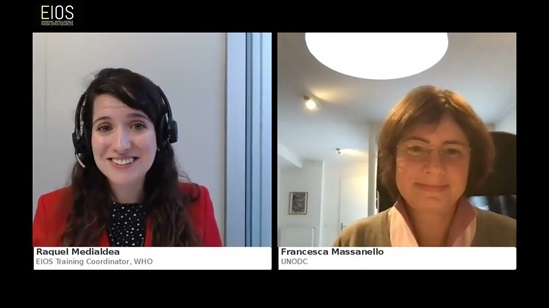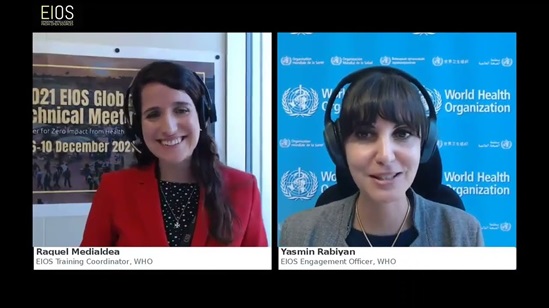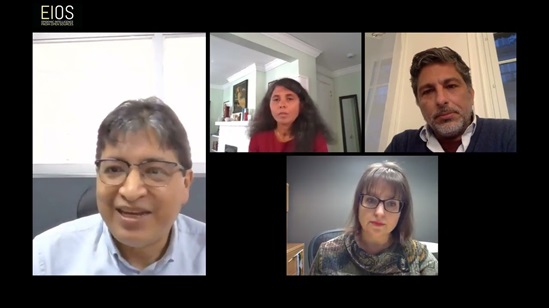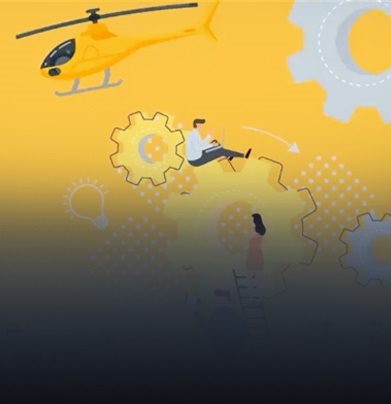
Public Health Intelligence in Action
Thursday, 9 December 2022
Public Health Intelligence (PHI) in action can be explored from many different angles. In line with some of the main principles and priorities of the EIOS initiative, on Day 4 we look at the topic from an all-hazards, One Health perspective (track 1) and from a capacity building angle (track 2). Sessions and respective discussions on both tracks are chaired by Raquel Medialdea Carrera, Epidemiologist and EIOS Training Coordinator at WHO. Raquel is joined by Nelson Olim, Head of Simulation Learning at the WHO Academy to moderate a panel discussion on the future of the PHI workforce at the end of track 2.
In the PHI for All Hazards session, various experts showcase PHI functions and activities from a variety of fields, subjects, and backgrounds. As evidenced by their diverse presentations, a unified all-hazards, One Health approach to early detection, verification, assessment, and communication of public health threats is essential to better prepare and protect the world from global health perils. In an increasingly connected world, threats to public health have the potential to quickly spread from local to national, regional, and international levels, affecting global health security faster than ever before. The need for a multi-disciplinary approach to public health has therefore become more evident than ever.
A well-trained PHI workforce, however, is a crucial prerequisite for any successful response to health threats. The COVID-19 pandemic has highlighted the need for developing and sustaining a workforce with knowledge, skills, and capacities to support the various PHI functions. In the session focused on PHI Capacity Building, experts from around the globe provide insights into how they are shaping the future of the global PHI workforce to drive effective and confident public health decisions and actions.
Session Recordings
Public Health Intelligence in Action: PHI for All Hazards
In the “PHI for All Hazards”-session, experts showcase different Public Health Intelligence functions and activities from a range of fields and perspectives. Chair Raquel Medialdea moderates this mixed panel including speakers from the United Nations Office on Drugs and Crime (UNODC), the WHO headquarters and Dakar offices, the European Commission, the Food and Agricultural Organization of the United Nations representing the tripartite Global Early Warning System (GLEWS) as well as the EcoHealth Alliance.
Chapters
0:00 Welcome Day 4 Track 1
18:15 Masanello/UNODC: The importance of Big Data to understand and analyze crime threats related to COVID-19
31:47 Vernaccini/WHO: Dynamic Preparedness Metric
52:00 Jankowski/EC: The Emergency Response Coordination Centre- situational awareness capacity, needs and challenges
1:04:35 Wamba/WHO: Collecting Sahelian information about deliberate events
1:16:47 Larfaoui/FAO: The Joint FAO–OIE–WHO Global Early Warning System for health threats and emerging risks at the human–animal–ecosystems interface (GLEWS+)
1:33:10 Epstein/ EcoHealth Alliance: Using serology and a One Health approach to understand spillover
1:46:54 Panel discussion
Public Health Intelligence in Action: Capacity Building
In the “Capacity Building”-session, Raquel Medialdea talks to experts involved in building capacity for PHI around the globe about what skills and training are needed to drive effective and confident public health decisions and actions. Speakers from TEPHINET, Ending Pandemic, Italy’s Istituto Superiore di Sanita (ISS) and the Centers for Disease Control and Prevention (CDC) share insights into their work in this field.
Chapters & Presentations
0:00 Welcome Day 4 Track 2
16:41 Jensen/TEPHINET: Building knowledge and skills of a field epidemiology workforce
29:18 Divi, Atanda, and Mantero/Ending Pandemics: The future PHI workforce is rooted in One Health
41:22 Riccardo/ISS Italy: Investing in training in PHI in a time of change
55:03 Hinkle/CDC: Enhancing Event-Based Surveillance Capacity in the African Region
Panel - Shaping the future of the Public Health Intelligence workforce
In this panel, Nelson Olim discusses the main gaps and opportunities for PHI and related capacity building at local, national and regional levels with Arunmozhi Balajee from the Centers for Disease Control and Prevention (CDC), Alixanderia Clymans from the Public Health Agency of Canada (PHAC) and Franklyn Prieto from the Field Epidemiology Program in Colombia. Together, they look at what is needed to improve this capacity and where they see opportunities for collaboration in shaping the future of the global PHI workforce.
Webinar 4: Collaboration for Emergency Response
Collaborating with experts across disciplines and performing public health intelligence activities during health emergencies is critical for a comprehensive response that saves lives. How can collaboration bring together varied data sources beyond biomedical data for informed decision making? How are public health practitioners leveraging the expertise of partners across disciplines to drive action? In this webinar, we hear from experts who are prioritizing collaboration for effective public health emergency response and who are demonstrating the value of applied public health intelligence in multi-disciplinary collaborations to strengthen response to health threats. We will dive into lessons learned from past public health emergencies, the challenges they faced in working with many actors and information streams, and what drives effective collaboration.
This webinar is chaired by:
Raquel Medialdea Carrera - Epidemiologist at the World Health Organization (WHO)
Presenters:
Bejtullahu: Global Outbreak Alert and Response Network (GOARN) - Collaboration for emergency response
Degail Chabrat and Van Kleef: A collaborative holistic approach towards context-specific evidence-based decision-making for real-time outbreak response
Luengo Oroz and Hoffmann Pham: Artificial Intelligence (AI) to leave no voice behind
Kolmer and McMenamin: Using analytics and intelligence to support early response for COVID-19 surges.
Chapters
0:00 Introduction
6:39 Bejtullahu/GOARN Collaboration for emergency response
18:40 Degail Chabrat/WHO and Van Kleef/ITM: Collaborative holistic approach for real-time outbreak response
36:45 Luengo Oroz and Hoffmann Pham/UN Global Pulse: AI to leave no voice behind
52:08 Kolmer and McMenamin/WHO: Analytics and intelligence for COVID-19 surges
1:04:15: Q&A




